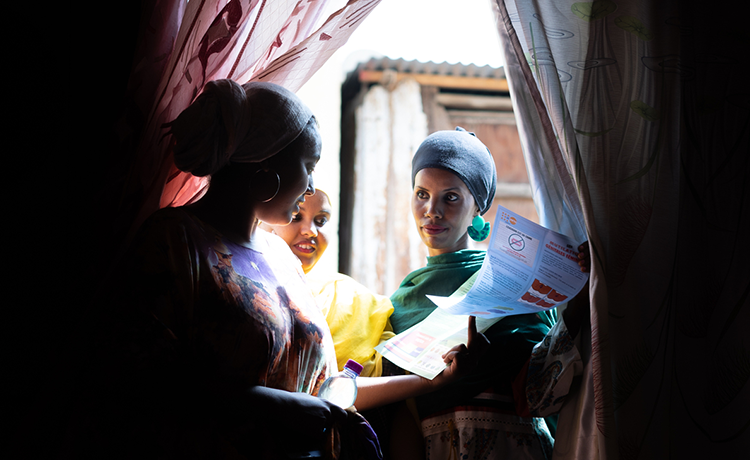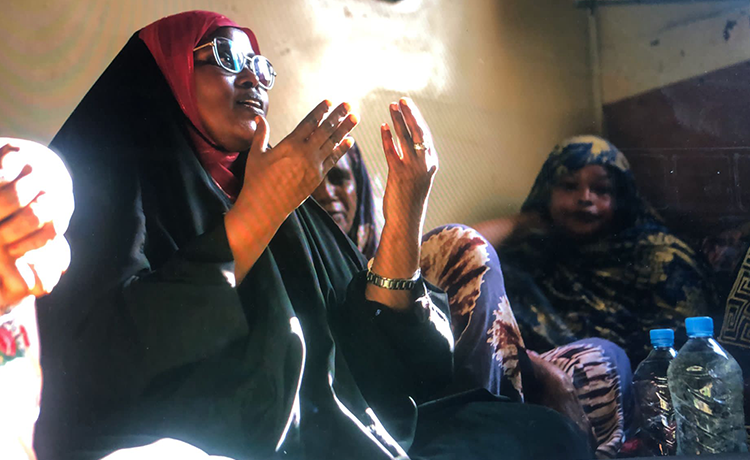News
Women leaders in Djibouti speak out against gender-based violence and harmful practices
- 25 April 2024
News
DJIBOUTI CITY, Djibouti – “There are so many young girls who get pregnant and have hidden, illegal abortions. Young girls are forced into sex work, and many are forced to undergo female genital mutilation.”
Nafisa, 44, is a community leader from Djibouti City and founder of the Rasmy women’s association, which is supported by UNFPA, the United Nations sexual and reproductive health agency. A chance encounter in 2011 spurred her to take up the cause as an advocate. “Fifteen years ago my place was at home, with the children – that was it.”
One day she struck up a conversation with a neighbour, Fardoussa*, who was a sex worker. Fardoussa confided that she had been subjected to violence from some customers, and was living in insecure housing along with several other sex workers. She felt isolated and vulnerable, she said, because of discrimination from others in their community.
The neighbours soon became close friends, and Nafisa came to realize that social norms, taboos and silence were at the root of many problems the women and girls in her community were dealing with. “She's a woman like me – in many ways, we’re the same.”
That’s when she launched Rasmy, to help fight harmful social norms and break the silence surrounding them. What began as a small, informal group soon grew into a community where women felt safe to express themselves without judgement.
Now members of Rasmy provide support for survivors of female-genital mutilation and gender-based violence, as well as advice on other sexual and reproductive health and rights issues. “Thanks to our outreach, many more mothers are aware of their daughters’ suffering, and many more girls are being saved,” said Nafisa.

Building coalitions
“My first period came after my mother died, so I had to talk to my dad about it,” said Imane, a community leader in Balbala, in the south of Djibouti City. “It was hard. The taboo made it very difficult to talk about issues of female intimacy with him.”
Imane had been subjected to female genital mutilation as a child, which was causing painful periods. Lacking knowledge on the problem, she turned to her father. “He listened and learned to support me. Afterwards he also refused to have my younger sisters cut.”
Djibouti has one the highest rates of female genital mutilation in the world, with more than 70 per cent of women aged between 15 and 49 put through the practice – although thanks to advocacy and legal initiatives, this has dropped in recent years from 93 per cent.
“I'd like to create more men like my father,” said Imane. “Too few men speak out, so my mission is to give them courage. To save girls, we must reach their fathers.”
Imane's father works alongside her, lobbying to end female genital mutilation with the NGO Caravanes et Savoirs du Désert, a travelling group of actors who perform plays to raise awareness on sensitive topics such as female genital mutilation and other forms of gender-based violence. Together with UNFPA, they hope to build a coalition of men and boys against harmful practices.
“I learned to distinguish between the positive aspects of our culture and the darker areas that must be brought to light,” explained Imane. “Men must understand that female genital mutilation is not just a woman's burden – violence is never just a women's issue.”

Breaking the silence
Nafisa and Imane’s associations are part of UNFPA’s Elle&Elles (‘She and Her’) network, launched in 2021 to provide support and training for female leaders advocating for women's health and rights in some of Djibouti’s most deprived areas.
“Joining the network opened up a new path for me,” said Imane. “My association was trained, and we all became peer educators. Now I share my story with young girls who are looking for someone to listen to, just like I was.
“My story, once shrouded in silence, has become my symbol of hope and resilience, supported by the strength of my father's listening and love.”
The network is so far made up of eight associations, each with six UNFPA-trained educators who engage in outreach on unintended pregnancies, drug addiction, gender-based violence, sexually transmitted infections and female genital mutilation. Members are also trained to liaise with communities to prevent and refer cases of gender-based violence.
“The Elle&Elles network embodies the strength and determination of these women and girls who are dedicated to their communities,” said Aicha Ibrahim Djama, head of UNFPA’s Djibouti office.
Since 2021, the network has reached more than 4,000 people. With UNFPA’s support, Nafisa’s organization has since become Djibouti’s first and only shelter for survivors of gender-based violence that provides refuge, advice, food and clothing.
“We give women courage,” said Nafisa. “We give them hope, and if I can help just one person, it’s a success.”
*Name changed for privacy and protection